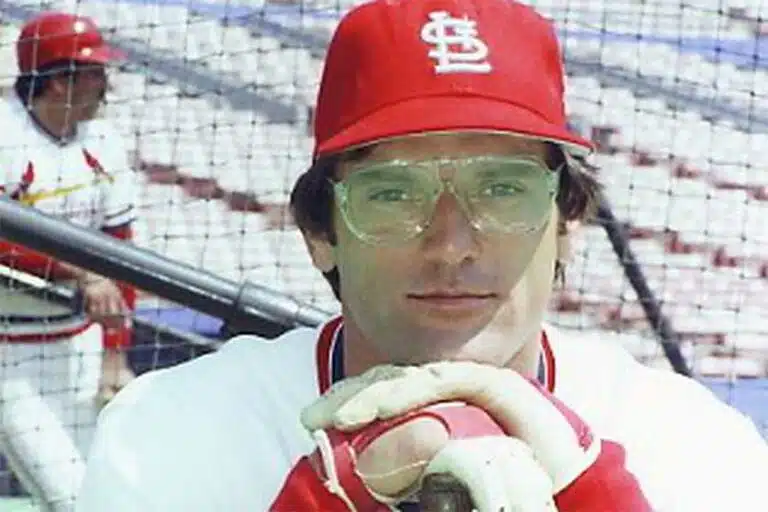Darrell Porter | Cocaine-Related Death
- How Darrell Porter Died
- About Darrell Porter
- Darrell Porter’s History Of Substance Abuse
- Did Darrell Porter Attend Drug Rehab?
- Recovery Is Possible

On August 5, 2002, former Major League Baseball player Darrell Porter was found dead in Sugar Creek, Missouri, at the age of 50. A medical examiner determined his death was due to excited delirium, the toxic effects of cocaine, and an enlarged heart.
Before his death, Darrell Porter was a major league catcher over 15 years with the Milwaukee Brewers, St. Louis Cardinals, Kansas City Royals, and Texas Rangers. He earned All-Star honors in four seasons and won the 1982 World Series with the Cardinals in 1982, where he won World Series MVP.
Outside of baseball, Porter publicly struggled with drug problems, which affected his personal life and playing career. He entered drug addiction rehab and joined a Christian sect after retiring from baseball, but ultimately succumbed to his decades-long struggle with addiction.
How Darrell Porter Died
On August 5, 2002, Darrell Porter was driving from Lee’s Summit to nearby Sugar Creek, Missouri, before he swerved off of the road and hit a tree stump next to the Missouri River. He was found dead next to his car later that day. An autopsy found cocaine in his system.
In a statement, the Sugar Creek Police Department stated that Porter might have attempted to push his car away from the tree stump, and that the exertion may have directly contributed to his death.
The Kansas City medical examiner at the time, Dr. Thomas Young, reported Porter’s cocaine levels as above average, but not indicative of an overdose.
He stated that the excessive heat and humidity of that day, along with Porter’s chronically enlarged heart, may have amplified the effects of cocaine in his body.
About Darrell Porter
Born Darrell Ray Porter in Joplin, Missouri, Porter played baseball from a young age and gravitated towards the catcher position.
He attended Southeast High School in Oklahoma City, where he played multiple sports and earned attention from football and baseball scouts alike. Porter eventually chose baseball, and was drafted by the Milwaukee Brewers in the 1970 amateur draft.
MLB Career
Porter made his major league debut in 1971. His next several seasons in Milwaukee were inconsistent, and only when he was traded to the Kansas City Royals did he succeed at the major league level. There, Porter met future Hall of Fame manager Whitey Herzog.
As a Cardinal, Porter posted impressive stats during the 1982 postseason, contributing at the plate with five hits and five walks in the Cardinals’ National League Championship Series victory over the Atlanta Braves.
His efforts earned him 1982 NLCS Most Valuable Player. Porter’s heroics continued with a home run in the Cardinals’ seven-game World Series victory over his former team, the Kansas City Royals.
Porter retired after the 1987 season with total career stats of 188 home runs, 826 RBI (runs batted in), and 905 walks. Porter was inducted into the Missouri Sports Hall of Fame in 2000.
Personal Life
Outside of baseball, Porter married twice. He and his second wife, Deanne Gaulter, had three children: Lindsey, Jeff, and Ryan. After retiring, Porter and his family settled down in Kansas City, where he committed himself to religious work.
Darrell Porter’s History Of Substance Abuse
Darrell Porter was introduced to drugs and alcohol as a part of MLB culture at the age of 18.
He recalled an experience where he walked into the Milwaukee Brewers clubhouse, where players were drinking beer and smoking cigarettes. He incorporated a variety of drugs and alcohol into his life soon after.
In multiple interviews, including one with the Associated Press, Porter described drug and alcohol use as a daily part of his routine, especially during his years as an MLB player.
Substances that he frequently abused included alcohol, cocaine, marijuana, and Quaalude, a barbiturate.
An Escape From The Agony Of Living
Porter personally documented his experiences with drug and alcohol abuse in his autobiography Snap Me Perfect! The Darrell Porter Story.
He viewed drugs and alcohol as an escape from “the agony of living” and a means to fit in. This literary work took an honest look at Porter’s struggles with addiction throughout his life.
The First Baptist Church held a small memorial service for Porter after his death.
His loved ones and former teammates honored his memory, while Kansas City Star journalist Joe Posnanski wrote: “We wanted to believe Darrell Porter when he said he quit cocaine […] and that’s why Monday’s news landed like a kick to the stomach.
Did Darrell Porter Attend Drug Rehab?
Darrell Porter entered drug and alcohol rehab during the 1980 MLB season, which his Kansas City Royals coaches and teammates encouraged. Despite a successful recovery, Porter wrote in Snap Me Perfect that alcohol and drug addiction can never be cured—only managed.
Recovery Is Possible
Drug and alcohol addiction can be difficult to treat without professional help that prepares you for life after treatment. Porter’s death is a reminder of how challenging it is to maintain recovery. However, recovery is possible with ongoing care and support.
To learn how we treat cocaine addiction and other substance use disorders, please contact Ark Behavioral Health today.
Written by Ark Behavioral Health Editorial Team
©2024 Ark National Holdings, LLC. | All Rights Reserved.
This page does not provide medical advice.
Baptist Press - ocaine killed Darrell Porter, medical examiner says of drug test
ESPN Classic - ESPN Classic - Heat may have played role in Porter's death
Society for American Baseball Research - Darrell Porter

Questions About Treatment?
Ark Behavioral Health offers 100% confidential substance abuse assessment and treatment placement tailored to your individual needs. Achieve long-term recovery.
100% confidential. We respect your privacy.
Prefer Texting?
Our friendly support team is here to chat 24/7. Opt out any time.







 Learn More
Learn More








